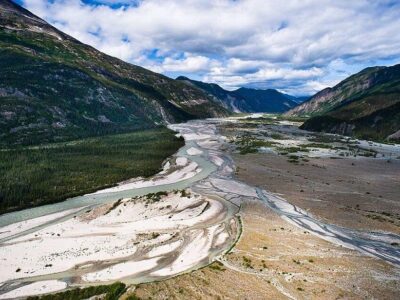By Tom Pacioni

What would it be like to create a country’s sustainability guide—from scratch—for real? At the request of the United Nations Development Programme (UNDP), four Columbia University graduate students are taking on that challenge for the mining industry in Guinea. Given the opportunity to dive deeply into the impacts and best management practices of a critically important industry in Guinea, Sustainability Management (SUMA) students Cecilia Coates, Dolores De La Cruz, and Ellen Griesemer, and Development Practice student Micah Cruz happily stacked this project onto their final semester’s workload. With a breadth of expertise that includes governance reform, international business, conservation ecology, and sustainability communication, the team is distinctly well-suited to the task. They’ve been guided throughout the project by Sustainability Management alum (SUMA ’15) Tom Pacioni, drawing on his leadership experience and expertise in environmental impact assessment and mitigation for the extractives industry. The independent study team is under the direction of professor Lynnette Widder.
The UN ranks Guinea, a country with a population of 12.4 million, as among the world’s least developed in infrastructure and foreign direct investment. Unsurprisingly, Guinea’s per capita CO2 emission rate is currently very low. However, Guinea is well-known for its abundance of natural resources, exemplified by its status as the world’s largest reserve of bauxite, the chief commercial ore used in aluminum manufacturing. Because Guinea’s bauxite industry is greatly underdeveloped, the government wants to dismantle barriers to growth; namely, limited public-private dialogue, lack of private-sector financing, and inadequate supply of energy and transportation. However, industry growth brings the specter of tremendous increases in GHG emissions.
Intriguingly, the Green Climate Fund (GCF) may be a valuable tool to spur growth in the industry through sustainability and climate projects. GCF is a United Nations financial mechanism that leverages public investment to stimulate private finance in climate change mitigation and adaptation. UNDP is an accredited partner of the GCF, helping applicants with project proposals to access funds. With Guinea’s interest in GCF assistance signaling a willingness to adopt sustainable development practices to meet their responsibilities under the Paris Agreement, UNDP began providing support to guide Guinea’s efforts with the bauxite industry. UNDP, in turn, approached the independent study team for help.
In short, UNDP needs to (a) better understand sustainability impacts from Guinea’s bauxite industry, and (b) provide a sustainability guide for Guinea’s government so that they can engage with the private sector to finance climate adaptation. To achieve these goals, Micah, Ellen, Dolores, and Cecilia are developing a profile of best practices directly applicable to Guinea’s bauxite industry and identifying energy supply opportunities to couple with mining initiatives. In early May, the team will travel to Guinea to lead a workshop with the Ministry of Mines & Geology, Ministry of Energy & Water Resources, and the Scientific Research Center of Conakry Rogbane covering:
- a purpose-built set of best practices,
- a pragmatic plan for engaging the private sector, and
- realistic energy-supply opportunities.

The project’s timing could not be better. Through 2015, Guinea’s bauxite-alumina industry contributed 25 percent of the country’s GDP and more than 60 percent of its exports. After decades of flat growth, Guinea’s bauxite production doubled between 2016 and 2017, and is poised to double again in the next few years. More importantly, recent investments from China will bring substantial alumina refining capacity (currently Guinea refines less than 1 percent of global alumina) and, ultimately, aluminum smelting capacity online. In addition to the energy and infrastructure challenges posed by adding sophisticated manufacturing technology, greenhouse gas emissions will increase exponentially. Thus, the team’s efforts alongside UNDP are crucial to Guinea establishing meaningful climate mitigation and adaptation policies and plans.
In fact, the project is already paying dividends: through its interactions, the team nucleated cross-organizational teamwork that did not previously exist between UNDP, the Green Climate Fund, and Power Africa, an initiative of the US Agency for International Development.
Recognizing the remarkable opportunity they have, it would be an understatement to say that the team is looking forward to meeting their colleagues in Guinea and sharing the results of their hard work.

The Sustainability Management Independent Study (SUMA PS5997) is a three-credit course that can be counted toward one of the five curriculum area requirements for the M.S. in Sustainability Management: Integrative Sustainability Management, Economics and Quantitative Analysis, Physical Dimensions, Public Policy or General and Financial Management. Students pursuing the M.S. in Sustainability Management can, with the support and approval of a faculty advisor, work on an independent project or study that includes a final deliverable related to the Sustainability Management curriculum area of their choice.
The M.S. in Sustainability Management, co-sponsored by the Earth Institute and Columbia’s School of Professional Studies, trains students to tackle complex and pressing environmental and managerial challenges. Visit our website to learn more.




Are there Bauxite refining and smelting facilities in Guinea?